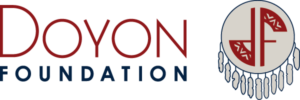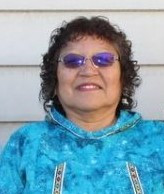“The biggest challenge is to grow Denaakk’e teachers”
Hᵾkk’aaghneestaatlno Lorraine David is the daughter of the late Joe and Celia Beetus of Hughes. Her paternal grandparents are the late Little Beetus and Ida of Hughes; her maternal grandparents are the late Jimmy and Annie Koyukuk of Allakaket.
Lorraine and her husband, Richard David of Allakaket, have five children: Tillila Beetus, Leonard Bergman, Shara Shewfelt, Richard (RJ) David, Jr., and the late Sharon David. Lorraine and Richard have 12 grandchildren (nine grandsons and three granddaughters). Lorraine’s siblings include sisters Alberta Vent, Helen Attla, Dorothy Vent, June Walker and Peggy Patterson; brothers Bob Beetus, Sam Beetus and Wilmer Beetus; and the late Arlo Beetus and the late Jimmy Beetus.
A recipient of Doyon Foundation scholarships, Lorraine attended the University of Alaska Anchorage and the University of Alaska Fairbanks (UAF). She holds a bachelor’s degree in business administration with an emphasis in human resource management and is employed by the Fairbanks Native Association, where she directs the Indigenous Language Project. Lorraine’s language is Denaakk’e (Koyukon).
Doyon Foundation: Family has played an important role in your language learning. How has that background helped shape your commitment to Denaakk’e teaching and learning?
Hukk’aaghneestaatlno Lorraine David: My father and mother, Joe and Celia Beetus, and Elders Julia Oldman and Maria Dummy from Hughes and Catherine Attla from Huslia were instrumental in teaching me to speak Denaakk’e. It was my first language — I wasn’t introduced to English until I was 6 years old.
When children are grounded in their language, culture and traditions, they have a sense of belonging and are more academically inclined. They’ll be proud of where they came from and who they are. If I can help one child live a good healthy life, I will have fulfilled my dream.
DF: You’re an accomplished, lifelong teacher. What’s a language learning strategy that successful students tend to have in common?
HLD: Speak the language as much as you can.
DF: You’ve devoted much of your time to developing activities where people may do just that.
HLD: When I worked at UAF for 30 years, I taught Denaakk’e to college students in the evenings for six of those years. At Anne Wien Elementary School in Fairbanks, I created a Denaakk’e classroom that completed its third year in 2020. There are two primary teachers and one classroom aide; I teach them to teach the language to 3 to 5 year olds.
I was involved with the Denaakk’e Hᵾdelnekkaa language group for parents and other adults and I taught the language part time for two years at Effie Kokrine Charter School in Fairbanks. I helped with “Molly of Denali” by translating and recording Denaakk’e words and phrases. (“The Molly of Denali” series aired in 2019 and was the first-ever TV show to feature an Alaska Native child as protagonist.)
Whenever anyone wants to know how to say and write a word or phrase, I help by making and sending a recording. As long as I’m able, I’ll help whoever wants to learn to keep our language alive.
DF: That’s a substantial legacy. What’s on your mind as you look ahead?
HLD: I’m nearing retirement age soon so someone else needs to take over. The biggest challenge is to grow Denaakk’e teachers. I’m fortunate to have the same staff for the past year — they’re learning the language and learning to teach. But staff turnover is a challenge.
Getting parents and other community members involved, hopefully in a future language school, will help grow teachers to teach Alaska Native languages. Doyon Foundation is doing an amazing job in creating resources for Alaska Native languages. Keep it up!
DF: You’ve mentioned the importance of recordings in Denaakk’e.
HLD: I never used to record the language because our belief was that if you record your voice, you’re giving away your spirit. I spoke to my mom about it before she passed and she gave me permission to record. Nowadays I record as much as I can for whoever wants to learn.
About Doyon Languages Online
Through the Doyon Language Online project, Doyon Foundation is developing introductory online lessons for Holikachuk, Denaakk’e (Koyukon), Benhti Kenaga’ (Lower Tanana), Hän, Dinjii Zhuh K’yaa (Gwich’in), Deg Xinag, Dinak’i (Upper Kuskokwim), Nee’anděg’ (Tanacross) and Née’aaneegn’ (Upper Tanana). The project officially launched in summer 2019 with the first four courses, now available for free to all interested learners.
Doyon Languages Online is funded by a three-year grant from the Administration for Native Americans (ANA), awarded in 2016, and an additional three-year grant from the Alaska Native Education Program (ANEP), awarded in 2017.
As Doyon Foundation continues to grow our language revitalization efforts in the Doyon region, we believe it is important to recognize people who are committed to learning and perpetuating their ancestral language. We are pleased to share some of these “language champion” profiles with you.
If you know a language champion, please nominate him or her by contacting our language program director at foundation@doyon.com. Language champions may also complete our profile questionnaire here. You may learn more about our language revitalization program on our website, or sign up to access the free Doyon Languages Online courses here.

